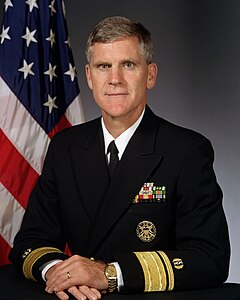Michael Lohr (lawyer): Difference between revisions
George Swan (talk | contribs) (add references) |
George Swan (talk | contribs) (more details) |
||
| Line 20: | Line 20: | ||
Lohr was the Navy's [[Judge Advocate General's Corps, U.S. Navy|Judge Advocate General]] in December 2002, when [[Alberto J. Mora]], the [[Department of the Navy]]'s General Counsel, convened several meetings of the Navy's most senior lawyers, to discuss the reports, from [[David Brant]], the Director of the [[Naval Criminal Investigative Service|NCIS]], that the Navy's tenants at Guantanamo, were abusing their captives.<ref name=USNAlbertoJMora2004-07-07/> | Lohr was the Navy's [[Judge Advocate General's Corps, U.S. Navy|Judge Advocate General]] in December 2002, when [[Alberto J. Mora]], the [[Department of the Navy]]'s General Counsel, convened several meetings of the Navy's most senior lawyers, to discuss the reports, from [[David Brant]], the Director of the [[Naval Criminal Investigative Service|NCIS]], that the Navy's tenants at Guantanamo, were abusing their captives.<ref name=USNAlbertoJMora2004-07-07/> | ||
According to the ''[[Sun Sentinel]]'' in February 2003 Lohr wrote<ref name=SunSentinel2005-07-28/>: | |||
:{| class="wikitable" | |||
| | |||
:"Will the American people find we have missed the forest for the trees by condoning practices that, while technically legal, are inconsistent with our most fundamental values?"<ref name=SunSentinel2005-07-28/> | |||
|} | |||
==References== | ==References== | ||
| Line 61: | Line 67: | ||
| url-status = live | | url-status = live | ||
| quote = | | quote = | ||
}} | |||
</ref> | |||
<ref name=SunSentinel2005-07-28> | |||
{{cite news | |||
| url = http://articles.sun-sentinel.com/2005-07-28/news/0507271135_1_interrogation-military-lawyers-guantanamo-bay | |||
| title = Lawyers Protested Prison Questioning: Memos Say Harsh Methods Put U.s. Forces In Danger | |||
| publisher = [[Sun Sentinel]] | |||
| date = 2005-07-28 | |||
| accessdate = 2012-06-11 | |||
| quote = Rear Adm. Michael Lohr, the Navy's chief lawyer, wrote on Feb. 6, 2003, that while detainees at Guantanamo Bay might not qualify for international protections, "Will the American people find we have missed the forest for the trees by condoning practices that, while technically legal, are inconsistent with our most fundamental values?" | |||
| author = Neil A. Lewis | |||
}} | }} | ||
</ref> | </ref> | ||
Revision as of 23:36, 4 February 2024
Michael Lohr is an American lawyer, and officer in the United States Navy.[1][2][3][4][5]
Lohr is notable for his participation in discussions, in December 2002, of reports that interrogators from the Joint Task Force 160 and Joint Task Force 170 were using controversial interrogation techniques on the captives held in the Guantanamo Bay detention camps, in Cuba.[1]
Lohr was the Navy's Judge Advocate General in December 2002, when Alberto J. Mora, the Department of the Navy's General Counsel, convened several meetings of the Navy's most senior lawyers, to discuss the reports, from David Brant, the Director of the NCIS, that the Navy's tenants at Guantanamo, were abusing their captives.[1]
According to the Sun Sentinel in February 2003 Lohr wrote[6]:
- "Will the American people find we have missed the forest for the trees by condoning practices that, while technically legal, are inconsistent with our most fundamental values?"[6]
References
- ↑ 1.0 1.1 1.2 Alberto J. Mora (2004-07-07). Memorandum from Navy General Counsel Alberto J. Mora to Navy Inspector General. United States Navy. Archived from the original on 2014-12-30. Retrieved on 2007-05-05.
- ↑ Leadership - JAG Corps.
- ↑ Rear Admiral Michael F. Lohr, Judge Advocate General Corps, United States Navy.
- ↑ Rear Admiral Michael F. Lohr, JAGC, USN.
- ↑ 6.0 6.1 Neil A. Lewis. Lawyers Protested Prison Questioning: Memos Say Harsh Methods Put U.s. Forces In Danger, Sun Sentinel, 2005-07-28. Retrieved on 2012-06-11. “Rear Adm. Michael Lohr, the Navy's chief lawyer, wrote on Feb. 6, 2003, that while detainees at Guantanamo Bay might not qualify for international protections, "Will the American people find we have missed the forest for the trees by condoning practices that, while technically legal, are inconsistent with our most fundamental values?"”
